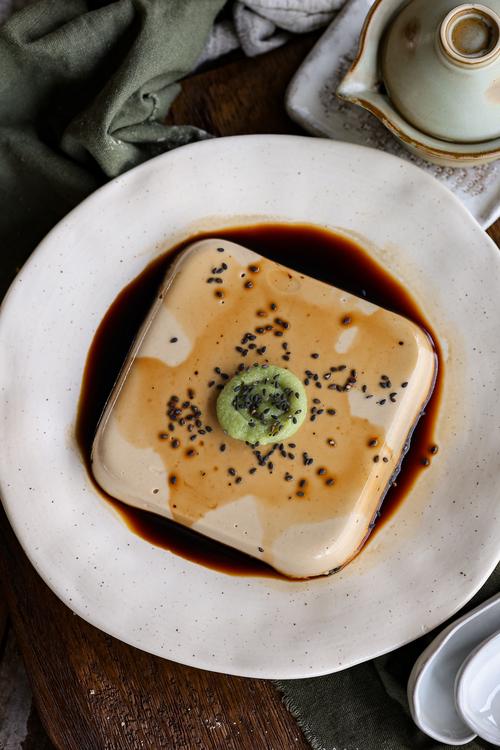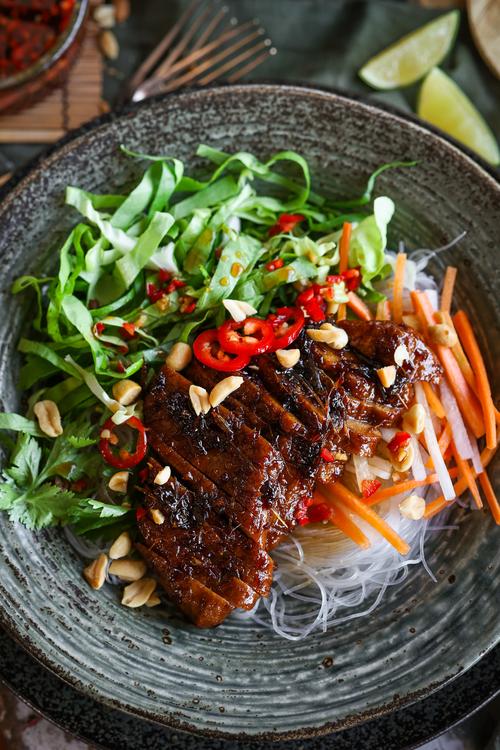
View on phone
Washed Flour Seitan
3 hr
Homemade staple
10 ingredients or less
Freezer-friendly
Servings
(110g per serving)
Total
3 hrPrep
30 minCook
1 hr + 10 minRest
1 hr + 20 minContains
Free from
Ingredients
Seitan
-
7 cups (959 g)bread flour†
-
3 cups (720 mL)water
Broth
-
1 Tbsp (15 mL)vegetable oil
-
1small onion, finely chopped
-
1carrot, finely chopped
-
1celery rib, finely chopped
-
2garlic cloves, crushed
-
6 cups (1440 mL)water
-
4dried shiitake mushrooms (optional)
Directions
- Mix the flour and water to form a dough.
- Knead the dough for 5 - 7 minutes.
- Rest the dough in water for 1 hour.
- Drain and replace the water and knead the dough in the water for 3 - 5 minutes.
- Drain the water and repeat adding new water and "washing" the seitan until the water is fairly clear. This might take 4 - 5 washing cycles. The more the seitan is washed, the tougher and more fibrous it becomes. Depending on the texture desired, do less or more washing cycles.
- Let the dough rest in an empty bowl for at least 20 - 30 minutes. It will release water as it rests.
- Meanwhile, add the oil, onion, carrot, celery, and garlic to a large pot. Cook until golden.
- Add the remaining broth ingredients and bring to a gentle simmer.
- To braid the seitan, leave an inch (2 cm) of the dough intact at one end. Cut two parallel slits along the length of the dough, then braid the three sections.
- Pull the braid slightly to stretch the dough and wrap it into a knot.
- Place the seitan knot into the simmering broth. Partially cover the pot with the lid, and cook for 1 hour. If the seitan isn't fully submerged, turn the seitan once or twice during the cooking process.
- Remove the seitan from the broth and strain out the solids from the broth*.
- Store the seitan, as is, in the broth liquid, or shred into bite-sized pieces before storing.
- Drain before using in your favourite recipes. Enjoy!
Notes
- †For best results, use a white flour.
- * Tip: use the leftover broth and strained veggies in a soup!
Storage
- Store the seitan, submerged in broth in an airtight container in the fridge for up to 1 week.
- The seitan can also be stored in the freezer, with or without the broth. Without the broth, it can be kept for up to a month. With the broth, it can be stored for 2 months. The broth will expand slightly during freezing, so be sure to use a suitable storage container.
Print
Let us know what you think
Nutrition info
Focusing on numbers can harm our relationship with food. Instead, our philosophy is to Nourish the Cells & the Soul. For specific nutrition needs due to a medical condition, consult a dietitian or physician. While we strive to provide accurate nutritional information, we cannot guarantee its accuracy. See our disclaimer for details.
Show nutrition info






































Leave a comment
Well... I did my best, but the whole thing really disintegrated in the washing-process. I did get a product out of it which only held together by practically deep-frying it. Plus it felt bad to see all that starch flushing down the drain.
Time to try the recipe with wheat gluten and chick pea flour! I have a feeling that will go a lot better :D
Hi PUL teams. Before I make this… I’ve had real issues eating the homemade seitan and some of the other recipes that use vital wheat gluten. It’s too gelatinous and makes me feel physically sick. Does this have that same texture? I like shop bought seitan’s such as This isn’t and It’s doesn’t taste like Chicken and Tofoo. So I’m not sure what’s going wrong. Does vital wheat gluten vary?
Hey, could you explain how you have calculated the nutrition values, as I am using seitan as a protein source for weight loss. Thanks!
I definitely want try what this thing is. Thank you
Would love to try this. For a disability friendly version, do you think a stand mixer with dough hook could work for the kneading? Perhaps a k paddle might work better for the watery kneading? Hmmm! Might make a mess but looks tasty enough to try.
Amazing and tasty seitan recipe!!❤️🔥❤️🔥❤️🔥
My first time making seitan and I'm pleasantly surprised how easy it was (I'm attributing the difficulties I ran into to my lack of knowledge in this area rather than the recipe itself). My kitchen needed as much of a wash as the dough, afterwards, but it was so much fun kneading and playing kitchen scientist 🤭
My Seitan ballooned like crazy in the pot, I'm not sure if that's normal, but maybe next time I'll just wash and knead it more to get a firmer consistency.
I've flash-fried a big chunk of it for a sandwich and I would've probably thought it was meat, had I not made it myself. So that's a success! And the broth is really tasty, too. I'll freeze it and use it as a base for some rich wintery gravies :)
I would love this recipe however it didn’t go well. I got wholemeal bread flour which probably was the mistake, however the recipe didn’t say if it needs to be the white one. The seitan was falling apart all the time. I will try next time the white flour though!
Wow what a flavorful recipe! It took some time to wash the rice, but honestly the process was so fun! The broth was exceptional!
Is it possible to freeze the seitan in the broth after making it? Can it hold up well if frozen? This recipe seems like a great one to prep in large batches and pull out as needed so I’d be curious as to how to preserve the finished product for the longest amount of time. Thanks!
Quick question, how much water are you supposed to use for the resting and washing? I've tried this but I feel like mine came out way too wet and it wouldn't really stick together during the washing, causing a lot of it to disappear down the drain...Or is it more likely a problem with my kneading technique?